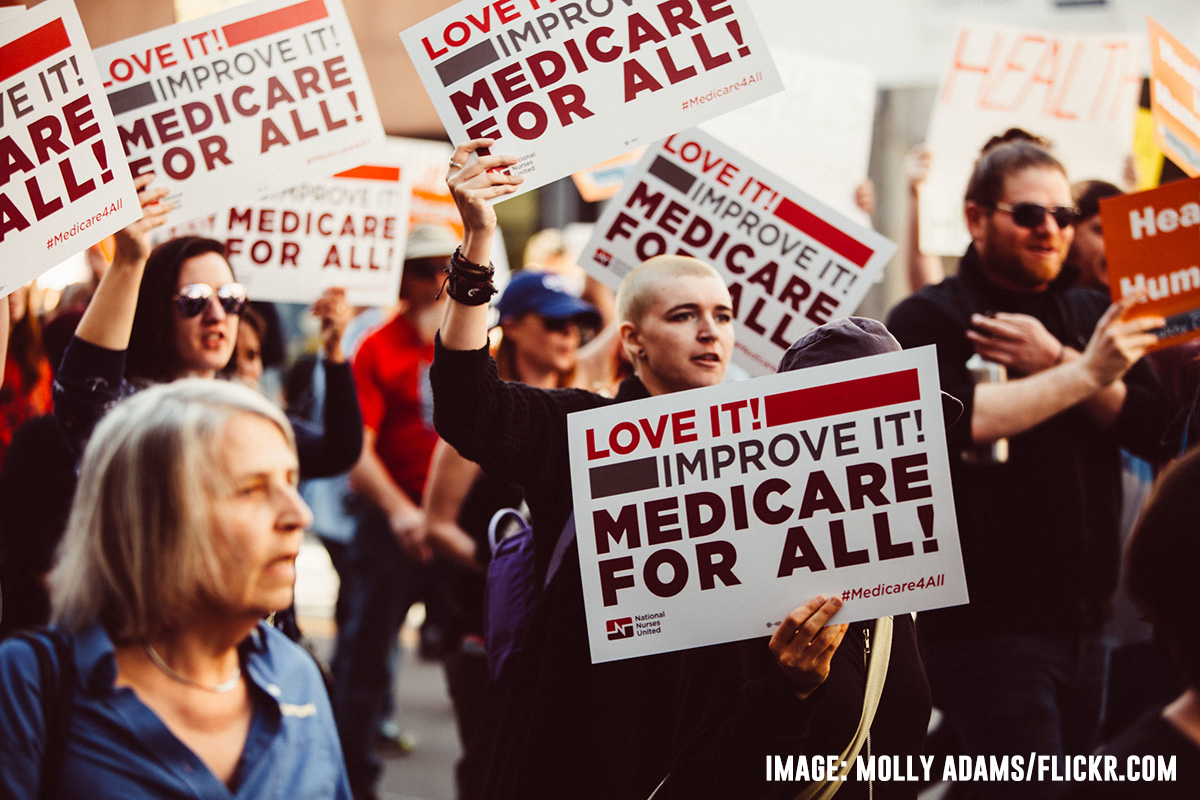Since 2000, 400,000 in the US have died using prescription opioids like Oxycontin. Big pharmaceutical companies make billions by lying about the dangers of these drugs and paying doctors to overprescribe. Nationalise healthcare now!
Two recent cases have highlighted the role of pharmaceutical giants in a US opioid crisis which has claimed the lives of over 400,000 people since 2000, and in 2015 alone cost taxpayers over $500bn.
In Oklahoma, the Johnson & Johnson pharmaceutical company was ordered in court to pay $572m in compensation due to a “false and dangerous” sales campaign which understated the dangers of addictive and often lethal prescription opioids in order to sell them across the country. Meanwhile, the multi-billionaire Sackler family, owners of Purdue Pharma, are negotiating a settlement to cover around 2,000 lawsuits relating to deaths from their drug, OxyContin. These companies knew full well the dangers of these drugs but marketed them as non-addictive pain-killers.
Use of prescription opioids, such as OxyContin and Vicodin, has skyrocketed, with over 200 million prescriptions last year. Johnson & Johnson and Purdue Pharma make enormous profits by persuading doctors, through financial incentives, to overprescribe these drugs. Last year, 627,000 doctors received a total of $2.1bn between them in non-research related payments from pharmaceutical companies. Additionally, between 2006 and 2015, pharmaceutical companies spent over $800m on lobbying. Healthcare providers and politicians are in the pockets of these legal drug cartels, which make enormous profits while causing widespread misery.
Overuse of prescription opioids has severe consequences. Overdoses are common and the drugs are extremely addictive. In 2016, two million Americans became addicted to prescription opioids. This often leads to using illegal opiates like heroin. An estimated 80% of new heroin users in 2016 got onto heroin after misusing prescription opioids. Over a million Americans now use heroin.
The impacts of opioid misuse are devastating and particularly affect young people in de-industrialised,‘rust belt’, areas. With American manufacturing in decline, and the loss of stable manufacturing jobs, young workers, prescribed opioids as painkillers, often continue using for short-term relief as they struggle to get by on low wages and with little support. Around a fifth of deaths for Americans aged 24-35 are attributable to opioids.
This tragedy has been manufactured purely in the interests of a few parasitic companies, profiting on death. These companies are now using the crisis as an opportunity to make a killing on drugs such as Naloxone, which reverses opioid overdoses, hiking up the price of these life saving drugs by 15,000% in the last decade.
For decades, governments have fought a “War on Drugs”, targeting working class and minority communities. Donald Trump specifically demonised Mexican immigrants for bringing drugs into the country. The poor, minorities and immigrants are not to blame for the drug crisis in America. The blame lies squarely on the shoulders of pharmaceutical companies that line their pockets at the expense of the lives of thousands.
 This scandal will not be solved through court action. The $572m won in the Oklahoma case cannot begin to mitigate the 6,000 deaths from opioid overdoses in Oklahoma since 2000 and is negligible compared to the $55 billion profits Johnson & Johnson made last year. This fact is reflected by the 5% rise in value for shares in the company, demonstrating continued investor confidence in the company.
This scandal will not be solved through court action. The $572m won in the Oklahoma case cannot begin to mitigate the 6,000 deaths from opioid overdoses in Oklahoma since 2000 and is negligible compared to the $55 billion profits Johnson & Johnson made last year. This fact is reflected by the 5% rise in value for shares in the company, demonstrating continued investor confidence in the company.
In the Purdue Pharma case, the company appeared ready to settle, with an offer of up to $12bn from the firm and a further $3bn from the Sackler family themselves. However, talks recently broke down and it looks likely that Purdue Pharma will file for bankruptcy, which will mean a lower payout. The company and family have consistently denied any wrongdoing and are looking to protect their assets. It was recently found that much of the family’s money is located in a system of trusts and companies that make it difficult to trace.
These cases highlight sharp contradictions between society’s needs and the interests of capital. Pharmaceutical companies make billions while millions of Americans suffer. When the courts try to hold them accountable they deny wrongdoing and protect their assets. The vast wealth held by these companies is more than enough to invest in addiction treatment centres across the country. Only by expropriating the major pharmaceutical companies as part of democratically planned health service and a socialist economy – to meet the needs of society, not the profits of the capitalists – can this crisis be resolved.





